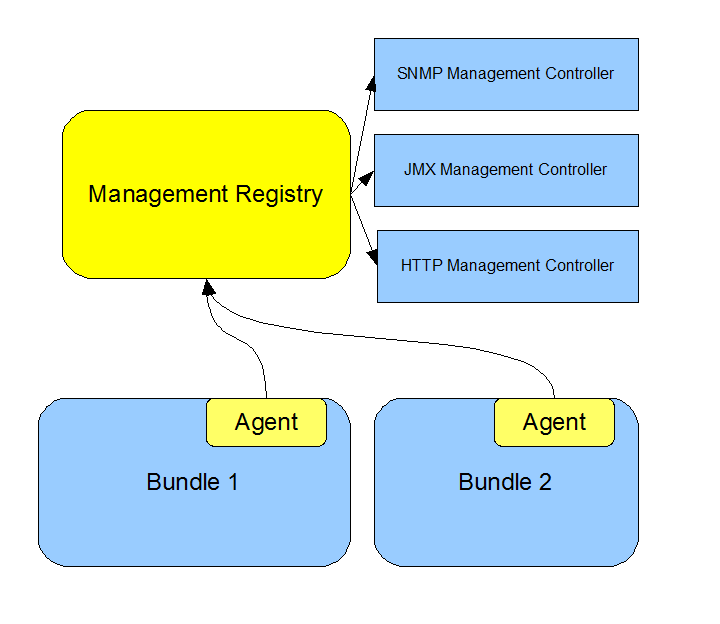Notice: This Wiki is now read only and edits are no longer possible. Please see: https://gitlab.eclipse.org/eclipsefdn/helpdesk/-/wikis/Wiki-shutdown-plan for the plan.
SMILA/Project Concepts/Generic Management And Monitoring Concept
Contents
Description
Currently SMILA uses separate modules for Management and for Performance Counters but both uses JMX/jconsole as a default presentation layer / UI.
During other SMILA components development it was found that both modules have issues.
This page is a concept about merging both modules into one generic module and solving issues found.
Discussion
Technical proposal
Current SMILA Modules
Performance Counters Module Architecture
Management Module Architecture
This chart shows the Management architecture:
Issues
Performance Counters Module issues
- its impossible to group counters into tree legally by API ( now its used "JMX specific names" hack to group them )
- its impossible to have several counters nested in common JMX leaf
- its impossible to predict when counter will be initialized (to start tracking) because it initialized only on usage
Management Module issues
- its impossible to group agents into tree
Common issues
- its impossible to mix performance counters and management agents methods nested in one JMX leaf
Proposal
Agent with Counters
Its suggested to use one registry class to work with management operations and with counters. Its planned to upgrade management module registry and remove performance counters registry.
Description and initialization of performance counters will be in the Agent implementation. It will allow to group counters (also together with management operations).
class MyAgent implements Agent{ // some management operation public doSomething(args[]); // some performance counter related to that module public Counter getCounterOne(); // other performance counter related to that module public Counter getCounterTwo(); }
But its also possible (and suggested) to split agent into independent Management Agent and Counters Agent to avoid dependencies. Mainly Management Agent using service and not used inside the service. And is visa versa for Counters Agent
class MyManagementAgent implements Agent{ ... public doSomething(args[]); .... } class MyMonitoringAgent implements Agent{ public Counter getCounterOne(); public Counter getCounterTwo(); }
Usage
But how to refer and use externally registered counters? For example, Crawler Controller Agent register globally "Total" counter. Each crawler instance should able to use it.
Its possible to pass CrawlerControllerAgent directly to crawler. Also if CrawlerControllerAgent was registered as service (its preferable way) its possible to find it by OSGi services registry. But also its possible to generate unique ID for crawler agent during registration and use it later.
class ServiceActivatorFirst{ init(){ POC_AGENT_ID = Registry.register(firstPocAgent) } dispose(){ Registry.unregister(POC_AGENT_ID) } } // in other class class TheSecondClass{ usingTheFirstPocAgent(){ FirstPocAgent firstPocAgent = Registry.get(ServiceActivatorFirst.POC_AGENT_ID) onePocAgent.getCounterOne().increment(); } }
Category Tree Construction / Registration
Its suggested to construct categories tree during registration
// manual categories ancestors iteration 1.Option: Separation between Management and Monitoring ManagementCategory category = ManagementRegistry.getCategory(ManagementRegistry.MANAGEMENTCATEGORY).getCategory("Crawler"); 2.Option: Management and Monitoring integrated ManagementCategory category = ManagementRegistry.getCategory("Crawler"); // first way to register category.register(agent); // the second way to register ManagementRegistry.register(category, agent); // third way to register only a special Performance Counter (without an encapsulating agent-class) ## dynamically ManagementRegistry.register(category, performanceCounter); // third way to register only a some Performance Counters (without an encapsulating agent-class) ## dynamically ManagementRegistry.register(category, performanceCounterList); // unregister Registry.unregister(agent); // or category.unregister(agent);
Also its suggested to assume that creation/removing of categories is done automatically by Registry and Category classes.
Trees:
1.Option: Separation between Management and Monitoring
SMILA - Management - CrawlerController - LuceneService - DeltaIndexing - Monitoring - CrawlerController - LuceneService - DeltaIndexing - Crawlers - FileSystemCrawler-HashID-DataSourceID - FileSystemCrawler-HashID2-DataSourceID2 - WebSystemCrawler-HashID2-DataSourceID2 - Pipelines - AddPipeline
2.Option: Management and Monitoring integrated
SMILA - CrawlerController - LuceneService - DeltaIndexing - Crawlers - FileSystemCrawler-HashID-DataSourceID - FileSystemCrawler-HashID2-DataSourceID2 - WebSystemCrawler-HashID2-DataSourceID2 - Pipelines - AddPipeline
The Performance Counters are shown under the JConsole Tab:Attributes and Management Functions are usable under the JConsole Tab:Operations.
Our suggestion is the second option.

